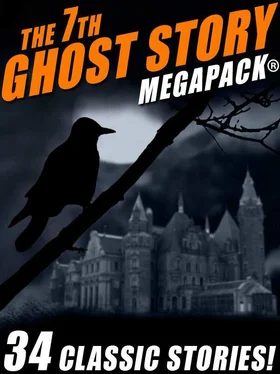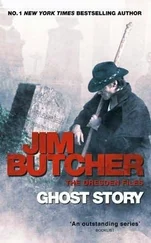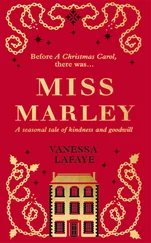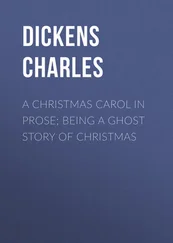As we came, so we returned—along the passage, through the still open panel, which closed behind me—into the gallery. I saw her face for one moment after this, and then throwing up her arms she vanished—vanished completely, as if she had never been there. I went to the window: nothing, nothing to be seen but the moon looking down in full beauty on the terrace garden, and no sound but the gentle moaning of the wind, which had risen during the night. Trembling in every limb, I stumbled back into my room, but more I cannot tell: I suppose I fainted; but the next thing I was conscious of was finding myself lying on my bed, the room in darkness, and still tightly grasped in my hand was the ring. I lit the candles, and kept them burning by me till the morning, when I fell into a sleep, and did not open my eyes till my maid stood by my bedside, and told me it was nearly breakfast time ; “And, ma’am, you do look bad!” was her sympathetic remark.
I dismissed her, and, jumping from my bed, ran to the looking-glass. I really think I expected my hair was grey—but it was still its own natural brown, I was thankful to see; but there were great black rings under my eyes, and my lips and face had lost all their colour. I opened the drawer, and there, lying in all its beauty, was the ring. I think the stones were the most wonderful I had ever seen; and as I slipped it on to my finger it covered quite three parts of it. I hastily dressed, and, opening the door, passed downstairs. It is a curious fact, but that consciousness of another presence had gone, completely gone, and I realised this with a sense of freedom and release as I hurried on. I opened the dining-room door: I was evidently very late, and all eyes were turned upon me.
“Good gracious, Mrs. Haywood!” exclaimed Lord Glencoine, “what has happened to you? You look as if you had seen a ghost.”
I did not answer; I walked across the room to where he was standing, and in a voice trembling so that I could hardly frame my words, I handed him the ring. “Lord Glencoine,” I said, “is this the ring?”
He took it, and he too looked as if he had seen a ghost. Silence fell on them all for a moment, while they remained looking at me.
“Good Heavens!” he said at last, “where have you been to find this? Am I mad, or is it real?”
Here they all crowded round him. Lady Glencoine became quite pale, and I thought she would have fainted; and I could see they all shrank a little from me, as if they thought I had been too near the supernatural world.
“I have been,” I answered, sinking into a chair, “into the room my crystal showed me; I have seen your jewels there massed, heaped into a hole in the stone floor.”
And then, slowly and with many pauses, I told them word for word what had happened—where I had been and what I had seen. I think if it had not been for the ring, which lay on the table a tangible proof of my story, they would one and all have declared me mad. But even Captain Shelvey, who had treated the crystal-gazing with contempt and ridicule, sat silenced. No more breakfast was eaten; nothing else was thought of: one and all declared that I must go and take them there at once. Here Lady Glencoine interposed. Excited as she was, she would not have me do this now. Seeing my state of mental and physical exhaustion, she insisted upon my lying down in her sitting-room and plying me with beef tea and brandy.
Although it was Sunday, all idea of church was abandoned, and an air of excitement and mystery pervaded the entire household.
However, after an hour’s rest and some food, I declared myself fit to go; and the whole party, led by me, proceeded upstairs. It struck me forcibly, as we passed along the gallery, the wonderful contrast of myself and my phantom guide of last night flitting along in the moonlight, in silence, with the dead of many years looking at us from the walls—and now ten chattering human beings tumbling over one another in their eagerness each to be the first to make the discovery. I walked straight to the panel—the last but one; and then I paused—paused, because suddenly and completely the knowledge and power of opening it had passed from me. My hands dropped to my sides, and I turned round and faced the anxious and expectant people.
“I have forgotten it,” I cried; “it has suddenly gone from me; I cannot tell you how to open it.”
“What do you mean?” said Lord Glencoine anxiously: “you told me it slid. Push it—let us try.”
He approached the panel, and he tried—we all tried—but nothing would do. For more than an hour we went on pushing, feeling for a bolt, trying by every means we could think of to effect an opening, but all in vain; at last we gave it up in despair, and went downstairs bitterly disappointed, and I sat hour after hour in the drawing-room, going through last night’s scene again—trying to recall the lady’s movements as she passed her hand along it: all in vain—the knowledge had gone from me, and it was useless. I could see, too, Lord and Lady Glencoine were terribly disappointed, though they did their best not to let me see it, and talked of having the panelling broken open the next day.
In the afternoon several of the party went for a walk, but Lady Glencoine and I remained by the fire, carrying on a spasmodic conversation. Suddenly a thought came to me, and I rose hastily and hurried to my room.
When there, I took the crystal from the drawer, and sitting down with it in my hand, I gazed into it, breathless with excitement. Should I, or should I not, see what I wished? I watched the usual mist rising in it; and then—yes—the lady again appeared; this time, though, her hand was not upraised, she was standing there. I longed, I almost prayed, that she might open the panel to me; and then, to my intense delight, I saw her hand slowly move towards the wall behind her, and, placing the back of her hand on the panel, she let her fingernails just pass under the framework, and it sprang open.
I waited for a moment till the picture faded away, and then, throwing down the crystal, I ran downstairs, almost falling down the steps in my haste. Into the drawing-room I flew, where my hostess was still sitting dreaming idly before the fire in the fading light.
“Come, come,” I cried, “I have found how to open it”. And startled, and I imagine rather thinking I had gone mad, Lady Glencoine followed me, calling to her husband, as she saw him passing through the hall, to come with us. I again went into the gallery and approached the panel. Trembling with excitement, my knees shaking beneath me, I placed the back of my hand on it, passing my finger-nails under the framework, and immediately it flew open. Almost faint with my discovery, I leant against the wall, and Lord and Lady Glencoine and their son remained staring at the open doorway.
I was the first to recover myself.
“A light—a light!” I cried; and ran to my room, returning with a candle and a box of matches.
“Lady Glencoine,” I said, lighting them, “either you or your son must wait here, as we cannot risk the door being shut upon us. Come, who will stay?”
“I had better do so,” she answered, “as I shall be of no use, and I am not quite sure I should like to venture into it.”
“But first,” I said (so certain was I that we should discover the jewels), “first we must get a crowbar, or something, which will remove the stone; because, although it is loose, it is a large one, and would be too heavy for our hands, I think.”
We touched the gallery bell; and the butler, who had lived many years in the family, answered it, and I think he was nearly overcome when he saw the open door, but he too was filled with excitement, and hurried off for an implement.
Then we started. I have often wondered since that we had the courage. I led the way, followed by Lord Glencoine, his son, and the butler.
Читать дальше












